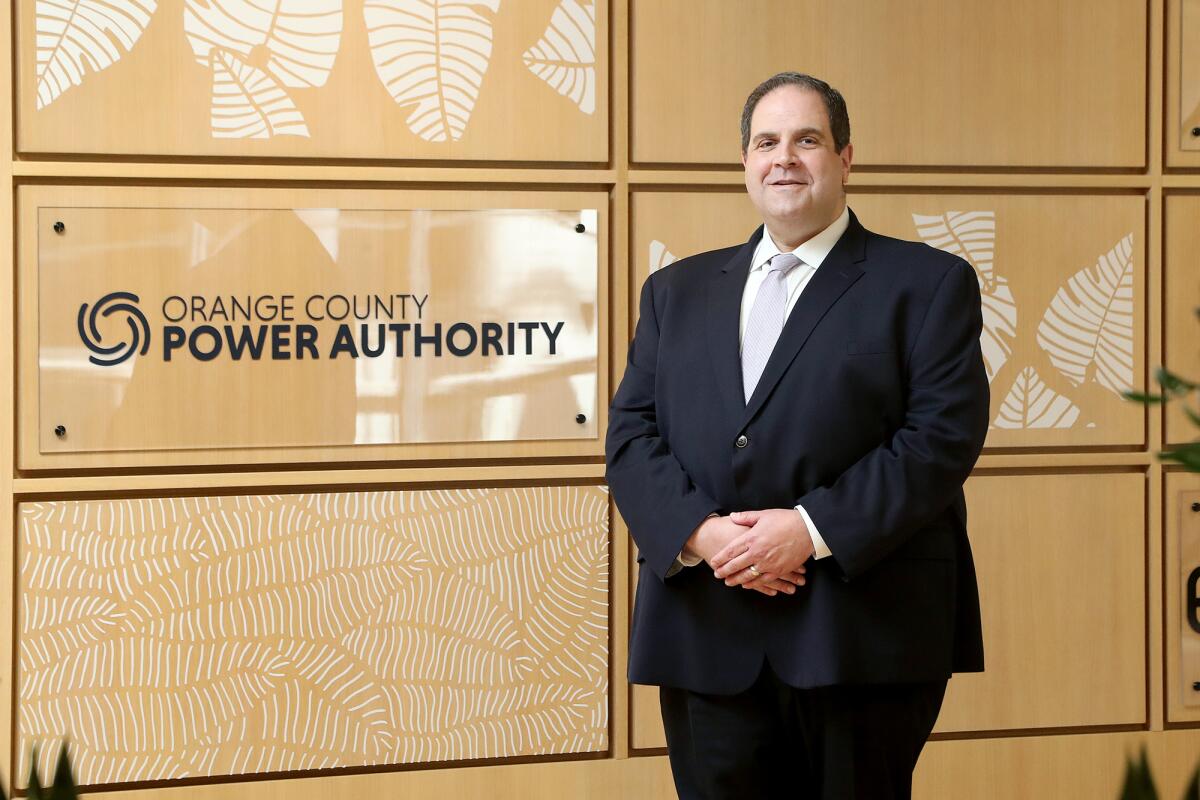O.C. Power Authority approves rate cuts for customers a day after report shows many have opted out of service

- Share via
The board of the clean-energy co-op supplying power to Huntington Beach and three other Orange County cities approved a rate cut and recognized the findings of a “clean audit” on Tuesday, one day after the release of a separate analysis that suggested tens of thousands of customers would likely opt out of the co-op’s service.
Residents of cities that joined the Orange County Power Authority, a community choice aggregation (CCA) leveraging the buying power of ratepayers in Huntington Beach, Buena Park, Fullerton, Irvine and unincorporated communities, were automatically opted into the program that began providing electricity to residents in early fall.
The energy co-op offers three pricing options: a base plan for customers who would get 38% of their power from renewable sources, a middle tier that would raise their portion of green-sourced electricity to 69% and another plan for those who wish to receive 100% renewable energy. The rates billed by the energy co-op are relative to those charged by Southern California Edison, the investment-owned utility that had long been the only provider of electrical service for many Orange County residents, OCPA Chief Executive Brian Probolsky said during an interview following a meeting of its board on Tuesday.
Initially, people in households on the authority’s “Basic Choice” option were paying the same as SCE’s customers for power, while those on the “Smart Choice” and “100 Percent Renewable Energy Choice” programs were charged 1 cent and 1.5 cents more per kilowatt-hour, respectively.
OCPA’s board of directors approved a plan to offer Basic Choice customers a rate 2% lower than what they would have been charged by SCE in 2023, along with a proportionate price cut for people signed up for the more expensive options. The new rates would go into effect in mid-January.
OCPA had been criticized for not offering a discount against its for-profit competitor when it launched, even though other CCAs operating at the time were. But the Orange County collective might have been able to if SCE hadn’t been undercharging customers, one of its board members, Huntington Beach City Councilman Dan Kalmick, suggested during Tuesday’s meeting.
“SCE was basically undercutting our ability to come in at a discount,” he said in a phone interview later that day.
The relatively lower rates for OCPA customers in 2023 are possible partly because Edison collected about $770 million and $970 million less in 2021 and 2022, respectively, than what it had spent to procure energy from the grid, according to Tiffany Law, OCPA chief financial officer.
To compensate for past shortfalls, SCE will raise its rates in 2023. That will allow OCPA to charge less in comparison for its basic plan, saving customers around $6.8 million, Probolsky said.
He further noted that a wide range of factors, including global supply chain problems and ongoing military conflicts have been driving up energy costs globally. Chief among those is climate change, which CCAs like the OCPA hope to combat by creating market-driven incentives to develop green energy solutions.
“We’re trying to claw that back,” Probolsky said. “Lower rates are nice, but they ebb and flow. We’re focused on fulfilling our mission, which is providing cleaner renewable electricity at competitive rates and then reinvesting back in programs for our residents and businesses and communities.”
Less competitive rates may be part of the reason a report released the day before the board’s meeting found that 16.5% of customers in its coverage area had opted to return to SCE. That’s a portion twice as high as what the co-op had initially planned for or what’s typically seen at other CCAs in California.
The report was commissioned by the Orange County Board of Supervisors, one of the bodies represented in the leadership of the OCPA. The supervisors have considered taking the unincorporated communities they represent out of the renewable energy partnership and will discuss the issue during a meeting on Dec. 20. Their appointee to the OCPA, Supervisor Don Wagner, was not present at Tuesday’s meeting.
Kalmick said OCPA faced more opposition than other CCAs from groups that went online and door to door to convince Orange County residents to opt out of its service. He acknowledged it was disappointing to see that its customer base was smaller than what had been projected but said that shouldn’t have an impact on OCPA’s rates or ability to reliably supply power.
OCPA’s launch had also been mired by concerns over a lack of experience among its executive staff. A harshly critical Orange County Grand Jury report pointed out that Probolsky had no prior experience leading a CCA and was the sole candidate suggested during the hiring process for its CEO. The Huntington Beach City Council had taken a vote of no confidence in his leadership of the co-op amid those criticisms.
The grand jury report also stated that OCPA officials were late in releasing financial data to the public, alleging that its executives were failing to be adequately transparent. That information was eventually made public before the report came out and remains updated on the Orange County CCA’s website, Probolsky said.
“Our board meetings are held in the open,” Probolsky said Tuesday. “People can participate in them in real time or go back and check them later on, our financials and policies are published on our website. We hear those concerns.”
An independent examination of OCPA’s finances presented Tuesday found no irregularities or apparent misconduct in how it was conducting business, said Brett Bradford of Pisenti and Brinker, the accounting firm that performed the audit. He also noted that the collective appears to be solvent. And according to data shared at the meeting, it is paying its debts on time and has amassed over $50 million in a reserve fund.
All the latest on Orange County from Orange County.
Get our free TimesOC newsletter.
You may occasionally receive promotional content from the Daily Pilot.









